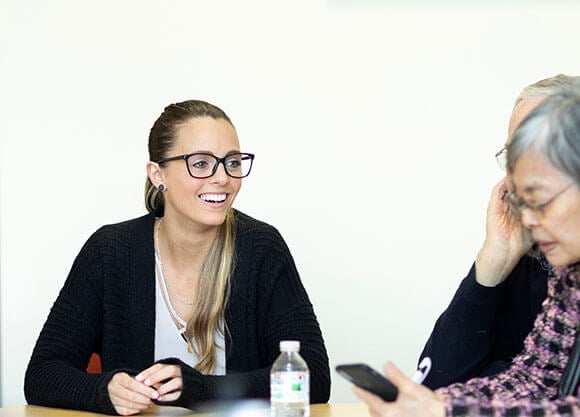
Social work student brings light to lives of those with vision impairment
March 22, 2019

March 22, 2019

“Working with older adults is something I’ve been passionate about for a long time,” she said. “If there is anything I can do for this population, I’ll do it."
The Lions Low Vision Center, located on Quinnipiac’s North Haven Campus, is a clinic offering occupational therapy and social work services to older adults struggling to adapt to life with vision impairment. There is no co-pay, and no wait times for appointments. Clients are first evaluated by licensed occupational therapists and Quinnipiac OT students who pair them with adaptive tools ranging from corrective lenses and low vision watches to contrast lighting for their homes.
The loss can have an impact on such things as the ability to cook, clean and drive. People often experience a gradual loss of autonomy and the shrinking of their everyday worlds, which can lead to depression, anxiety and other mental health conditions.
“People usually don’t realize they are actively grieving the loss of all these things,” Panniello said. “That’s where we come in.”
Panniello and the rest of Lions’s social work staff conduct bio-psycho-social-spiritual assessments with every client. In addition to providing a sympathetic ear, they help clients take advantage of local senior centers, home health care services, and programs such as Meals on Wheels and MyRide, a transportation service.
“One woman just wanted to know if her library delivered audiobooks,” Panniello said. “Each person’s needs are different, and we get to know them as best we can.”
Sometimes, their greatest need is simply to talk with others who are coping with similar experiences. That’s why Lions offers a monthly low vision support group, a powerful resource available to every client.
“It’s very therapeutic for them,” Panniello said. “We laugh; we cry — it’s all good.”
Perhaps even greater than the laughter and cathartic tears, Panniello helps clients make and sustain real human connections, stemming their risk for social isolation.
“Amanda easily engages clients,” said Professor Laura Mutrie, who co-facilitates the group with Panniello. “Her passion and energy for this work are truly inspirational to me as a mentor and teacher.”
Because of her work with the Lions Low Vision Center, Amanda is interested in pursuing a career focused on the needs of the aging population.
Panniello’s work in the Lions center eventually led her to social work professor Stephanie Jacobson, who was researching the effects of social isolation in older adults based on factors such as ethnicity/race, gender, population density, and zip code. Jacobson was looking for students to assist her with the sheer breadth of her research. Panniello enthusiastically volunteered.
“Amanda was conscientious, enthusiastic and a pleasure to work with on research,” said Jacobson. “She is curious to learn and takes every opportunity offered to her.”
For their participation, Panniello and several of her peers were included in a grant that enabled them to attend the Gerontological Society of America’s Annual Scientific Meeting in Boston, a conference that showcases leading research on aging.
At the conference, Panniello was surprised to learn that research on social isolation in older adults was sparse in the United States compared to other parts of the world. One eye-opening presentation by AARP about things that can prolong loneliness in older adults put all of her experiences and studies into perspective.
“It’s a domino effect that can begin with the loss of something like vision,” Panniello said.
She returned from the conference a passionate and outspoken advocate for improving aging policy in the U.S. She also plans on tackling similar research during her own clinical career.
“This is something I can definitely do in the future,” she said. “It’s a growing field, and the need is unbelievable.”
Quinnipiac Today is your source for what's happening throughout #BobcatNation. Sign up for our weekly email newsletter to be among the first to know about news, events and members of our Bobcat family who are making a positive difference in our world.
Sign Up Now